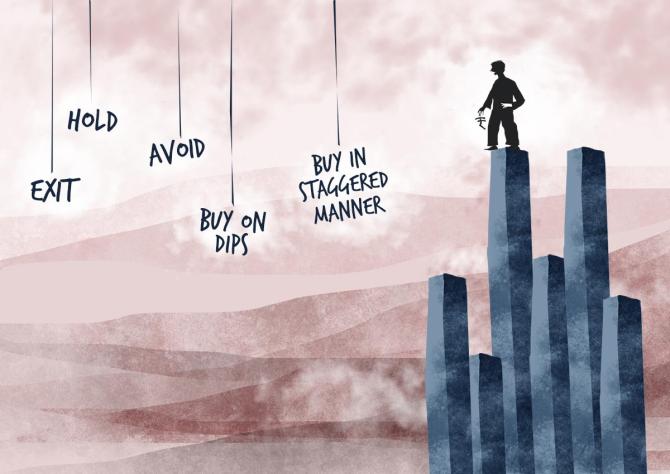'Today, there is no easy money to be made after the run-up in equities.'

Global brokerages have raised concerns about India's record valuation premium to other emerging markets.
Anand Radhakrishnan, managing director and chief investment officer-Emerging Markets Equity-India, Franklin Templeton, explains the reasons for India always trading at a premium.
In an interview with Samie Modak/Business Standard, Radhakrishnan says as corporate profits improve over the coming quarters, price-to-earnings (P/E) multiples will look normal.
Concerns are being raised about India's valuation premium to EM peers. Is it sustainable?
India has historically traded at a premium to EM peers, based on collective factors like demographic dividend, good corporate governance, and reasonable sector diversification.
Additionally, recent efforts to improve the structural strength of the economy with long-term-oriented reform measures are expected to support corporate earnings growth.
We expect India to continue trading at a long-term premium to the EM pack.
Will high valuations eat into future returns?
The market is currently trading at a valuation above long-term averages.
However, we find that after a significant fall in corporate profits as a percentage of GDP over the past few years, profitability is now coming back and, therefore, we will see corporate profits improving in the coming quarters.
With a catch-up in earnings, the optically high P/E can start normalising.
Earnings trend will take some time to get firmly established before it starts the next wave of market up-move.
How does one approach equity investing at this juncture?
Equity valuations remain stretched as the gradual improvement in earnings growth is yet to justify these valuation levels.
Additionally, news flow remains uncertain with regards to the status of global liquidity management and inflationary concerns.
Instead of trying to time the market to find the perfect entry point, we recommend systematic investing based on your risk and goal assessment from a long-term perspective.
Sticking to diversified portfolios with exposure to multiple market capitalisations could be considered.
How will risky assets react to taper or interest rate hikes?
The upcoming reversal of quantitative easing programmes in advanced economies could induce short-term volatility in risky asset classes, as well as in segments of global bond markets.
EM equities, primary recipients of stimulus-driven portfolio flows, may face sell-off pressures.
However, the impact on EMs may vary depending on economic strength and the pace of vaccination coverage in these regions.
Continued sell-off may weigh on EM currency and forex reserves positions.
Rising interest rates will negatively impact the real estate sector.
What are the other key risks to the market?
Key risks for the domestic growth recovery may emerge from potential virus variants disrupting the resumption of economic activities.
While the US Federal Reserve has charted a broad path for lowering its asset purchases and subsequently hiking rate, it remains to be seen how the start of actual tapering will disrupt sentiments and impact flows to emerging markets like India.
Commodity price inflation poses risk to oil-importing emerging markets, though India seems less vulnerable to oil shock today than 7-8 years ago.
The key leg to sustainable growth is the revival of the capex cycle (corporate and household).
Any delay or disruptions that threaten this revival will cool off overall market sentiment.
Will the huge primary market issuance impact secondary market performance?
Liquidity support from FPIs for primary issuances in CY21 has been tremendous.
Between January and August 2021, three-fourths of the FPI flows came through the primary market route.
However, a rally in equities continued during this period implying support to the secondary markets from both domestic investors and FPIs.
While the issuance of fresh equity soaks up market liquidity to an extent, the continuation of retail and foreign investor interest is key to absorbing such outflows.
Current trends seem to suggest that the kind of businesses that are raising equity, have favourable growth trends and hence attract good interest.
Any sector/theme that can do well from here?
We are looking at three broad themes that may do well over the medium-to-long term.
i. Domestic cyclical growth orientation: Recovery in economic growth being led by multiple factors bodes well for domestic cyclical sectors, which are the first sectors to benefit from a cyclical uptick.
ii. Consolidation and shift of market share from smaller unlisted players to large, listed ones: This trend has been unfolding over the last few years.
Key large players in many sectors have grown faster than respective industry averages.
An increasing degree of formalisation in the economy is expected to augur well for large businesses commanding size and scale.
iii. Tech-led disruption: The pandemic tremendously accelerated adoption of internet and digital businesses.
The presence of enabling factors like regulations, technology, platforms, logistics, social acceptance, and huge investor interest may offer interesting investment opportunities in tech-led businesses, especially in fintech, ed-tech, and food-tech.
Any sector/theme you want prune exposure to or believe the best has played out?
Last year, the markets were normalising to become more broad-based.
But today, there is no easy money to be made after the run-up in equities.
Valuations have risen to breach long-term averages in most sectors.
From here on, it will be a stock-specific approach to be adopted and not a broader sector approach for investing.
Growth is the biggest driver. If at the sector level, growth outperforms expectations, that may be a trigger for further rally.
Feature Presentation: Aslam Hunani/Rediff.com












